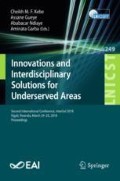Abstract
Designing an educational scenario is a sensitive and challenging activity because it is the vector of learning. However, the designed scenario may not correspond to some learners’ characteristics (pace of work, cognitive styles, emotional factors, prerequisite knowledge, …). To personalize the learning task and adapt it gradually to each learner, several scenarios are needed. Adaptation and personalization are difficult because it is necessary on the one hand to know in advance the profiles and on the other hand to produce the multiple scenarios corresponding to these profiles. Our model allows to design many scenarios without knowing the learner profiles beforehand. Furthermore, it offers each learner opportunities to choose a scenario and to change it during their learning process. The model ensures that all announced objectives have enough resources for acquiring knowledge and activities for evaluation.
Access this chapter
Tax calculation will be finalised at checkout
Purchases are for personal use only
Notes
- 1.
- 2.
- 3.
- 4.
Person responsible of the educational follow-up in the online training platform.
- 5.
Consulted at 11-24-2017.
- 6.
References
Greer, J.E., McCalla, G.I.: Student Modelling: The Key to Individualized Knowledge-Based Instruction. Springer, Heidelberg (2013). https://doi.org/10.1007/978-3-662-03037-0
Psotka, J., Massey, L.D., Mutter, S.A. (eds.): Intelligent Tutoring Systems: Lessons Learned. Lawrence Erlbaum, Hillsdale (1988)
Carron, T., Marty, J.-C., Heraud, J.-M., France, L.: Helping the teacher to re-organize tasks in a collaborative learning activity: an agent-based approach. In: Proceedings of the 6th IEEE International Conference on Advanced Learning Technologies, Kerkrade, The Netherlands, pp. 552–554 (2006)
Lefevre, M., Jean-Daubias, S., Guin, N.: Personnaliser des séquences de travail à partir de profils d’apprenants. In: Environnements Informatiques pour l’Apprentissage Humain, Le Mans (2009)
Monterrat, B., Yessad, A., Bouchet, F., Lavoué, É., Luengo, V.: MAGAM: a multi-aspect generic adaptation model for learning environments. In: Lavoué, É., Drachsler, H., Verbert, K., Broisin, J., Pérez-Sanagustín, M. (eds.) EC-TEL 2017. LNCS, vol. 10474, pp. 139–152. Springer, Cham (2017). https://doi.org/10.1007/978-3-319-66610-5_11
Mbatchou, G.M.: Accompagnement de l’apprentissage/formation : modélisation du scénario pédagogique. In: Iksal, S., Michel, C., Pelissier, C. (eds.) 6èmes Rencontres Jeunes Chercheurs en Environnements Informatiques pour l’Apprentissage Humain, pp. 95–100. Association des Technologies de l’Information pour l’Education et la Formation (ATIEF), Montpellier (2016)
Quintin, J.-J., Depover, C., Degache, C.: Le rôle du scénario pédagogique dans l’analyse d’une formation à distance Analyse d’un scénario pédagogique à partir d’éléments de caractérisation définis. Le cas de la formation Galanet. In: EIAH 2005, Montpellier, France (2005)
Paquette, G.: L’ingénierie pédagogique : pour construire l’apprentissage en réseau. Presses de l’Université du Québec (2002)
Dalziel, J.: Using LAMS version 2 for a game-based learning design. J. Interact. Media Educ. 2008(2), Art. 22 (2008). https://doi.org/10.5334/2008-24
Emin, V., Pernin, J.-P., Guéraud, V.: Scénarisation pédagogique dirigée par les intentions. Rev. STICEF 18 (2011). ISSN 1764-7223. http://sticef.univ-lemans.fr/num/vol2011/01-emin-tice/sticef_2011_tice_emin_01.htm
Mariais, C.: Modèles pour la conception de Learning Role-Playing Games en formation professionnelle (2012). https://tel.archives-ouvertes.fr/tel-00702237
Brassard, C., Daele, A.: Un outil réflexif pour concevoir un scénario pédagogique intégrant les TIC. Presented at the Environnements Informatiques pour l’Apprentissage Humain 2003 April 17 (2003)
Riad, B., Mourad, H., Nourredine, G., Hamid, S.: The scenarization: a new task for teachers. Procedia - Soc. Behav. Sci. 31, 732–737 (2012)
Marne, B., Labat, J.-M.: Model and authoring tool to help adapt serious games to their educational contexts. IJLT 9, 161–180 (2014)
Falmagne, J.-C., Cosyn, E., Doignon, J.-P., Thiéry, N.: The assessment of knowledge, in theory and in practice. In: Missaoui, R., Schmidt, J. (eds.) ICFCA 2006. LNCS (LNAI), vol. 3874, pp. 61–79. Springer, Heidelberg (2006). https://doi.org/10.1007/11671404_4
Heller, J., Steiner, C., Hockemeyer, C., Albert, D.: Competence-based knowledge structures for personalised learning. Int. J. E-Learn. 5, 75–88 (2006)
Breen, D., Shorten, G., Aboulafia, A., Zhang, D., Hockemeyer, C., Albert, D.: Defining a competency map for a practical skill. Clin. Teach. 11, 531–536 (2014)
Steiner, C.M., Albert, D.: Competence-based knowledge space theory as a framework for intelligent metacognitive scaffolding. In: Biswas, G., Bull, S., Kay, J., Mitrovic, A. (eds.) AIED 2011. LNCS (LNAI), vol. 6738, pp. 563–565. Springer, Heidelberg (2011). https://doi.org/10.1007/978-3-642-21869-9_102
Falmagne, J.-C., Albert, D., Doble, C., Eppstein, D., Hu, X. (eds.): Knowledge Spaces: Applications in Education. Springer, Heidelberg (2013). https://doi.org/10.1007/978-3-642-35329-1
Melero, J., El-Kechaï, N., Labat, J.-M.: comparing two CbKST approaches for adapting learning paths in serious games. In: Conole, G., Klobučar, T., Rensing, C., Konert, J., Lavoué, É. (eds.) EC-TEL 2015. LNCS, vol. 9307, pp. 211–224. Springer, Cham (2015). https://doi.org/10.1007/978-3-319-24258-3_16
Marfisi-Schottman, I., Labat, J.-M., Carron, T.: Building on the case teaching method to generate learning games relevant to numerous educational fields. In: International Conference on Advanced Learning Technologies, ICALT, Beijing, China, pp. 156–160 (2013)
Author information
Authors and Affiliations
Corresponding author
Editor information
Editors and Affiliations
Rights and permissions
Copyright information
© 2018 ICST Institute for Computer Sciences, Social Informatics and Telecommunications Engineering
About this paper
Cite this paper
Mbatchou, G.M., Bouchet, F., Carron, T. (2018). Multi-scenario Modelling of Learning. In: Kebe, C., Gueye, A., Ndiaye, A., Garba, A. (eds) Innovations and Interdisciplinary Solutions for Underserved Areas. InterSol 2018. Lecture Notes of the Institute for Computer Sciences, Social Informatics and Telecommunications Engineering, vol 249. Springer, Cham. https://doi.org/10.1007/978-3-319-98878-8_19
Download citation
DOI: https://doi.org/10.1007/978-3-319-98878-8_19
Published:
Publisher Name: Springer, Cham
Print ISBN: 978-3-319-98877-1
Online ISBN: 978-3-319-98878-8
eBook Packages: Computer ScienceComputer Science (R0)

